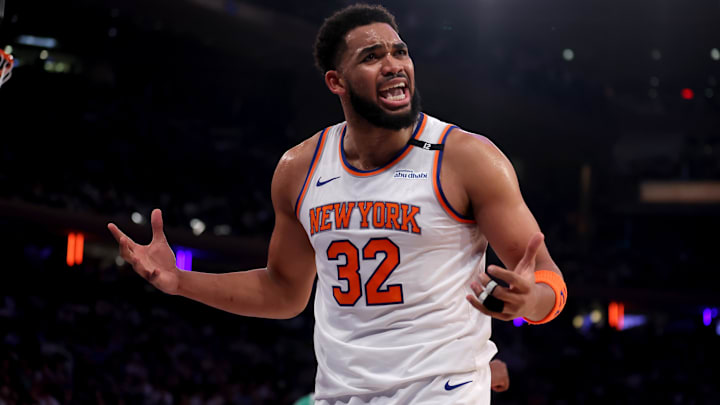Tom Thibodeau appears to finally be giving New York Knicks fans what they want: a starting lineup change for Game 3 of the Eastern Conference Finals against the Indiana Pacers.
Getting away from the current opening five is the right move. But it also highlights one of the Knicks' biggest problems, which also doubles as an uncomfortable reality check:
They probably never should have traded for Karl-Anthony Towns.
This change can't hide a hard truth for the Knicks
This lineup shift will see Mitchell Robinson take Josh Hart's spot, according to SNY's Ian Begley. Playing two bigs together has yielded mixed results against the Pacers, but fans will embrace the concept of Thibs doing something, anything, differently in the face of a 2-0 series lead.
The Knicks' usual starting five has been outscored by 29 points through the first two games of the Eastern Conference Finals, and is now minus-50 for the entire playoffs. It is an extension of an issue that exploded to the surface during the regular season. New York's combination of Hart, Jalen Brunson, Karl-Anthony Towns, Mikal Bridges, and OG Anunoby has been a net negative since the start of January.
Subbing in Robinson could work. Though he has only logged nine minutes with non-Hart starters all year, he has been one of the Knicks' most impactful postseason players, and should juice the defense and offensive rebounding, all while letting Hart inject second units with a jolt of adrenaline.
Still, even if this move works out in the interim, it points to a bigger, Karl-Anthony Towns-sized issue: He can't be New York's primary big man when it matters most. At the very least, he can't be the only big across certain matchups.
Indiana drove this point home hardest during Game 2. People harp on Thibodeau's lineup decisions, but Towns is a questionable defender even at his peak. More to the point, building a league-average-or-better defense around both him and Brunson is beyond difficult. They both give opposing offenses too many weak points at which to poke and prod. Even if the three wing players around them are perfect, there will always be cracks—mismatches to hunt, spotty screen navigation to exploit, brain farts away from the ball, etc.
Knicks must revisit Towns' future over the offseason
Robinson can cover up for and clean up a bunch of that stuff. It may come at the expense of offensive versatility. Starting he and Towns together might also mean actual minutes for Precious Achiuwa off the bench. It's nevertheless a worth move under the circumstances. The problem is, these circumstances aren't going anywhere unless the Knicks do the unthinkable over the offseason: trade Towns after only having for one season.
This may seem brash. It's not. Short of winning the title, which means you never have to say sorry, New York does not have the financial or trade flexibility for its highest paid player to be a big man who requires another big man next to him.
Not only is it prohibitively expensive, but it defeats the purpose of having Towns, who's supposed to be the skeleton key capable of unlocking five-out lineup staples. It gets even more problematic when you consider the Brunson-KAT pairing on offense isn't actually as dominant as intended. And there's a chance it may never be. Brunson seems best at ripping apart defenses when he has roll-man gravity to work alongside rather than someone with pick-and-pop pull.
Playing with Towns and Robinson theoretically offers the best of both worlds. But it changes the complexion of the rotation. More than that, the Knicks are on the shallower end to begin with. Paying almost 35 percent of the cap for Towns moving forward, if he can't be the primary big, is a drain on financial resources.
As things currently look, New York seems better off spreading out Towns' $53.1 million next season to multiple rotation players. Beating the series and maybe winning a title won't necessarily change that. Even with a championship in hand, the Knicks will always be walking a fine line with Towns as the focal point of their payroll. Regardless of how the playoffs end, that's something they need to reconsider and potentially change over the offseason.
